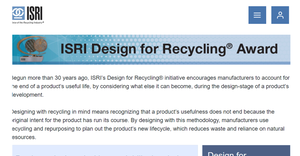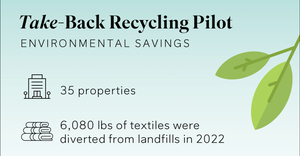Is frugality the new green?
As I noted in last month's column, "Slimming Down," America's waste production declined by 5 million tons in 2008. Recycling tonnages were also down. The Great Recession was the major reason we made and recycled less. When people have less money, they buy fewer things.
However, two other factors also have had an impact. One is changes in material use in our society. Paper use, especially printed grades such as newspaper, is down dramatically. Another example is replacing heavy products with lighter ones, such as the ongoing switch to plastic packages. Scientists even have a name for this phenomenon. They call it “dematerialization.”
The other factor is a concerted effort by American manufacturers and retailers to convert wastes into resources. I cited efforts by a number of companies to reduce or eliminate their garbage cans and to increase the size of their recycling and composting bins. These businesses have a direct financial incentive to turn a debit into an asset. By using less material to make products and by converting their waste stream into a resource stream they are being resourceful capitalists.
Taken together, these factors made 2008 a banner year for waste reduction, which is at the top of EPA's solid waste hierarchy. For those of us in the solid waste and recycling industry, the key question is what will happen when the Great Recession is over. Changes in the materials we use and an increased emphasis by manufacturers on lower their waste footprint (“wasteprint?”) will continue. But will American consumers start spending again, thus creating more waste and recyclables?
Many commentators believe we are entering a new era of reduced consumption. For the last year, the Wall Street Journal has been awash with stories about a new frugal consumer. In mid-January, an International Monetary Fund study concluded that American consumption will continue to decline. While that report was written in language that only an economist would love, Indiana Governor Mitch Daniels was more succinct when he argued that American consumers borrowed too much and overspent. He predicted that the lower consumption levels are permanent. Even famed American investor Warren Buffet has noted a “reset” to lower consumer spending.
If these commentators are right, per capita waste generation will continue to decline. EPA says it went down by a little more than 3 percent in 2008. That trend is likely to continue for several years. However, more people usually means more garbage and more recycling. The key issue for solid waste and recycling managers is whether population growth will trump frugal consumers.
The good news is that Americans remain eager to recycle and compost. The number and scope of these programs increased in 2008 even as tonnages went down. This trend will continue.
But will our new frugality be a permanent reality or will we return to our old consumptive habits? If history is any guide, we have not entered a permanent era of less stuff. Humans are an acquisitive species with a longstanding pattern of wanting more things rather than less. Waste generation will increase when people have money in their pockets and the confidence to spend it. As a result, we should continue to emphasize that waste is a resource while finding ways to continue achieving that goal.
Related Stories
Chaz Miller is state programs director for the Environmental Industry Associations, Washington, D.C.
Opinions in this column do not necessarily reflect those of the National Solid Wastes Management Association or the Environmental Industry Associations. E-mail the author at [email protected].
About the Author(s)
You May Also Like




